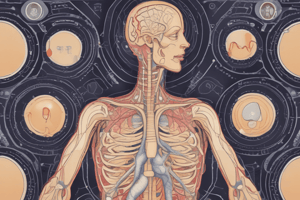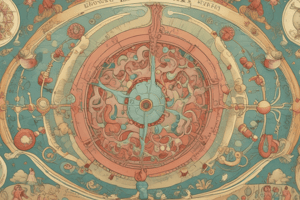Podcast
Questions and Answers
Which gland is responsible for producing and releasing various hormones that regulate the functions of other endocrine glands?
Which gland is responsible for producing and releasing various hormones that regulate the functions of other endocrine glands?
- Parathyroid glands
- Thyroid gland
- Adrenal glands
- Hypothalamus (correct)
What is the main function of the pineal gland?
What is the main function of the pineal gland?
- Regulate calcium levels in the body
- Produce sex hormones
- Control metabolism and bodily functions
- Regulate sleep and circadian rhythms (correct)
Which hormone is primarily responsible for developing and maintaining sexual characteristics and maturation in men?
Which hormone is primarily responsible for developing and maintaining sexual characteristics and maturation in men?
- Luteinizing hormone (LH)
- Testosterone (correct)
- Follicle-stimulating hormone (FSH)
- Melatonin
Where are the adrenal glands located in the body?
Where are the adrenal glands located in the body?
What do the parathyroid glands work together with to regulate calcium levels in the body?
What do the parathyroid glands work together with to regulate calcium levels in the body?
Which gland is responsible for regulating salt, water balance, and blood pressure?
Which gland is responsible for regulating salt, water balance, and blood pressure?
What is the most important regulator of blood calcium levels?
What is the most important regulator of blood calcium levels?
Which gland controls metabolism, growth, maturation, and nervous system activity?
Which gland controls metabolism, growth, maturation, and nervous system activity?
Where are hormones released into in the body?
Where are hormones released into in the body?
What are molecules produced by endocrine glands and released into the bloodstream called?
What are molecules produced by endocrine glands and released into the bloodstream called?
Flashcards are hidden until you start studying
Study Notes
Endocrine System: Hormones and Glands
The endocrine system is a complex network of glands that produce and release hormones, which are chemical messengers that regulate various bodily functions. These hormones influence nearly every aspect of human health, from growth and development to metabolism, electrolyte balances, and reproduction. The major endocrine glands include the hypothalamus, pituitary gland, thyroid gland, parathyroid glands, adrenal glands, and gonads (testes and ovaries).
Hormones
Hormones are molecules that are produced by endocrine glands and released into the bloodstream. They can have various effects on target cells throughout the body, depending on the hormone and the specific receptors they bind to. Some examples of hormones and their functions include:
- Adrenal glands: Aldosterone regulates salt, water balance, and blood pressure, while corticosteroids are involved in inflammation and stress response.
- Parathyroid glands: Parathyroid hormone (PTH) is the most important regulator of blood calcium levels.
- Thyroid gland: Thyroid hormones control metabolism, growth, maturation, nervous system activity, and metabolism.
- Pituitary gland: This gland releases several hormones, such as luteinizing hormone (LH) and follicle-stimulating hormone (FSH), which control the production of sex hormones (estrogen in women and testosterone in men).
- Gonads: Testosterone in men and estrogen in women develop and maintain sexual characteristics and maturation.
- Pineal gland: Melatonin is released by the pineal gland and helps regulate sleep and circadian rhythms.
Endocrine Glands
Endocrine glands are specialized cells and tissues that produce and release hormones. They are considered endocrine glands because they release their products directly into the bloodstream, which then carries them to target cells throughout the body. Some examples of endocrine glands and their functions include:
- Hypothalamus: This gland in the brain produces several releasing and inhibiting hormones that act on the pituitary gland, stimulating the release of pituitary hormones.
- Pituitary gland: Often referred to as the "master gland," the pituitary gland is responsible for producing and releasing various hormones that regulate the functions of other endocrine glands.
- Thyroid gland: Located in the neck, the thyroid gland is involved in controlling metabolism and other essential bodily functions.
- Parathyroid glands: These four small glands work together with the thyroid gland to regulate calcium levels in the body.
- Adrenal glands: Also known as the suprarenal glands, the adrenal glands are located on top of the kidneys and produce hormones that help with inflammation, stress response, salt, water balance, and blood pressure regulation.
- Gonads: The testes and ovaries are responsible for producing sex hormones and regulating reproduction.
The endocrine system is essential for maintaining homeostasis and overall health. Hormone imbalances can lead to various health conditions, so it is crucial to understand the functions of the endocrine glands and the hormones they produce.
Studying That Suits You
Use AI to generate personalized quizzes and flashcards to suit your learning preferences.




